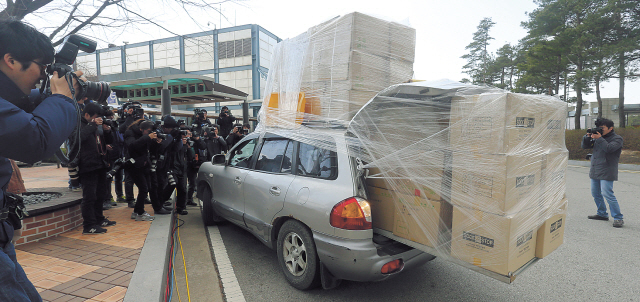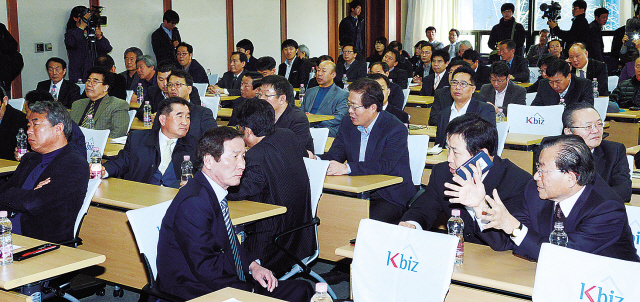North Korea heightens tension, Gaeseong operations come to halt
By Korea HeraldPublished : April 9, 2013 - 20:09
The operation of the inter-Korean industrial complex in Gaeseong came to a complete halt Tuesday, a day after North Korea said it would pull out all of its workers.
No North Korean workers showed up to the 123 South Korean firms in the complex, the last remaining symbol of cross-border economic cooperation. Only about 200 security staffers came to work, Seoul officials said.
It was the first time for factories there to fully stop since the complex initiated operations in 2004 with high hopes that it would help increase bilateral exchanges and ease tensions on the peninsula.
Last Wednesday, Pyongyang blocked the entry of South Korean workers and cargo, expressing anger over South Korean media reports that it was raking in cash from the industrial town while still churning out belligerent threats against Seoul and Washington.
No North Korean workers showed up to the 123 South Korean firms in the complex, the last remaining symbol of cross-border economic cooperation. Only about 200 security staffers came to work, Seoul officials said.
It was the first time for factories there to fully stop since the complex initiated operations in 2004 with high hopes that it would help increase bilateral exchanges and ease tensions on the peninsula.
Last Wednesday, Pyongyang blocked the entry of South Korean workers and cargo, expressing anger over South Korean media reports that it was raking in cash from the industrial town while still churning out belligerent threats against Seoul and Washington.

More than 53,000 North Koreans were working at the complex for a monthly average pay of $144. Through the complex, the cash-strapped country takes in more than $90 million each year.
The Seoul government on Tuesday reaffirmed it had no plans yet to withdraw all of its citizens from the complex, stressing that its stance that the complex should run as normal remained unchanged.
On the day, 77 of the 475 South Koreans at the complex were to return home.
President Park Geun-hye expressed “deep disappointment” over the stoppage of the factories in the complex, urging Pyongyang to stop its “wrong behavior” and make the right choice for all Koreans on the peninsula.
“How long do we have to repeat this vicious cycle of forging a crisis, reaching a compromise and then offering assistance (to the North)?” she said during a Cabinet meeting at Cheong Wa Dae.
“The most important prerequisites for foreign investment are predictability and trust. When North Korea contravenes international norms and promises like this and halts the industrial complex, there will be no other countries or enterprises willing to invest in the North.”
A recent series of provocative moves by the North has put Park’s signature “peninsular trust-building process” to the test. Cheong Wa Dae remains stern over North Korea, claiming Pyongyang should first change its course for any breakthrough in the bilateral ties.

Under the process, the Park government is to offer humanitarian aid to the impoverished state and initiate low-level bilateral economic cooperation based on the progress in Pyongyang’s denuclearization efforts. Should much progress on denuclearization be made, Seoul would seek large-scale international infrastructure support for the North.
During a parliamentary forum, Seoul’s Unification Minister Ryoo Kihl-jae urged Pyongyang to stop any acts that “distort or test” Seoul’s intentions over the inter-Korean relations, demanding the North immediately normalize the complex’s operations.
“Pyongyang should quickly address the current abnormal situations and respond to our efforts to build inter-Korean trust,” he said. “Should it opt to make the right choice toward a path for change, Seoul in tandem with the international community would do its best to help the North.”
The association of South Korean firms in the complex called on the government to mobilize “all possible means” to keep the complex alive, saying it hoped to send a delegation of South Korea’s small and medium enterprises for bilateral consultations.
They also stressed they had no plans yet to withdraw from the complex, urging the government to normalize the operations of the factories there as soon as possible.
Meanwhile, Seoul officials believed Pyongyang could launch an intermediate missile around Wednesday, as the communist state had warned the safety of foreign missions in its country would not be guaranteed after that date.
Some analysts also said the North could set off some provocations around April 15, the birthday of the late national founder Kim Il-sung, or April 25, the founding anniversary of the North Korean army.
Amid missile threats, the Japanese government has decided to dispatch the Patriot Advanced Capability-3 interception system near its capital Tokyo.
Japan has issued an order to destroy incoming missiles and deployed to the East Sea two Aegis-equipped destroyers carrying the Standard Missile-3 that can intercept incoming short- to intermediate-range ballistic missiles.
By Song Sang-ho (sshluck@heraldcorp.com)
-
Articles by Korea Herald


![[AtoZ into Korean mind] Humor in Korea: Navigating the line between what's funny and not](http://res.heraldm.com/phpwas/restmb_idxmake.php?idx=644&simg=/content/image/2024/04/22/20240422050642_0.jpg&u=)
![[Exclusive] Korean military set to ban iPhones over 'security' concerns](http://res.heraldm.com/phpwas/restmb_idxmake.php?idx=644&simg=/content/image/2024/04/23/20240423050599_0.jpg&u=20240423183955)


![[Graphic News] 77% of young Koreans still financially dependent](http://res.heraldm.com/phpwas/restmb_idxmake.php?idx=644&simg=/content/image/2024/04/22/20240422050762_0.gif&u=)

![[Herald Interview] Why Toss invited hackers to penetrate its system](http://res.heraldm.com/phpwas/restmb_idxmake.php?idx=644&simg=/content/image/2024/04/22/20240422050569_0.jpg&u=20240422150649)






![[Exclusive] Korean military to ban iPhones over security issues](http://res.heraldm.com/phpwas/restmb_idxmake.php?idx=652&simg=/content/image/2024/04/23/20240423050599_0.jpg&u=20240423183955)



![[Today’s K-pop] Ateez confirms US tour details](http://res.heraldm.com/phpwas/restmb_idxmake.php?idx=642&simg=/content/image/2024/04/23/20240423050700_0.jpg&u=)